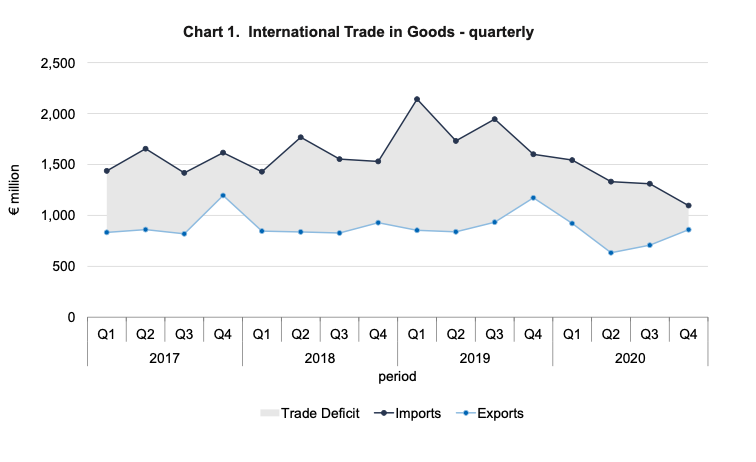According to data released by the National Statistics Office (NSO) on Tuesday, Malta’s annual imports from the UK fell by nearly €1 billion in 2020.
The NSO’s report on international trade in goods for December 2020 shows that imports to Malta from the UK dropped from €1.36 billion in 2019 to €397 million in 2020.
Despite the plummeting drop in imports, as international trade in 2020 was stunned by the pandemic, Malta’s exports to the UK decreased much less significantly, from €56 million in 2019 to €45.8 million in 2020, meaning that in 2020, the Malta – UK balance of trade stood at €-351 million, as opposed to €-1.3 billion in 2019.
Globally, Italy exported the most goods to Malta in 2020, at just over €1 billion. However, this is a decrease in the figure from 2019, which shows that Malta imported €1.255 billion.

Most of Malta’s imports in 2020 came from the EU (excluding the UK), with the country importing €2.8 billion out of the country’s total €5.3 billion worth of imports.
Malta’s dramatically decreased import volumes are reflected in the nation’s overall balance of trade figure, which fell from €-3.6 billion in 2019 to €-2.2 billion in 2020.
Outside of Europe, Malta imported the most goods from China, with imports totalling €371 million.
Trade in most commodities sunk distinctly. Perhaps most notably, Malta’s trade in mineral fuels, oils, and products falling €660 million in 2020.
Among the commodities that bucked the trend were paper and paperboard articles, salt; sulphur; earths; plastering materials and cement, and aircraft; spacecraft and parts thereof, which were all traded more in 2020 than 2019.
Of Malta’s main exports during the year dominated by COVID, pharmaceutical products were predictably the standout performer in 2020, with €360 million worth exported in 2020, as opposed to €288 million in 2019.
Malta’s economic growth to remain strong in global context, but sectoral shifts raise productivity concerns
While Malta continues to outpace eurozone peers in GDP growth, sectoral data suggests a growing reliance on less productive industries
Trump tariffs to take effect soon: EU prepares swift but measured response as trade tensions escalate
European businesses, policymakers, and investors alike are bracing for another potentially destabilising episode in transatlantic trade
Malta’s International Investment Position declines slightly
The largest component of these assets was Direct Investment






